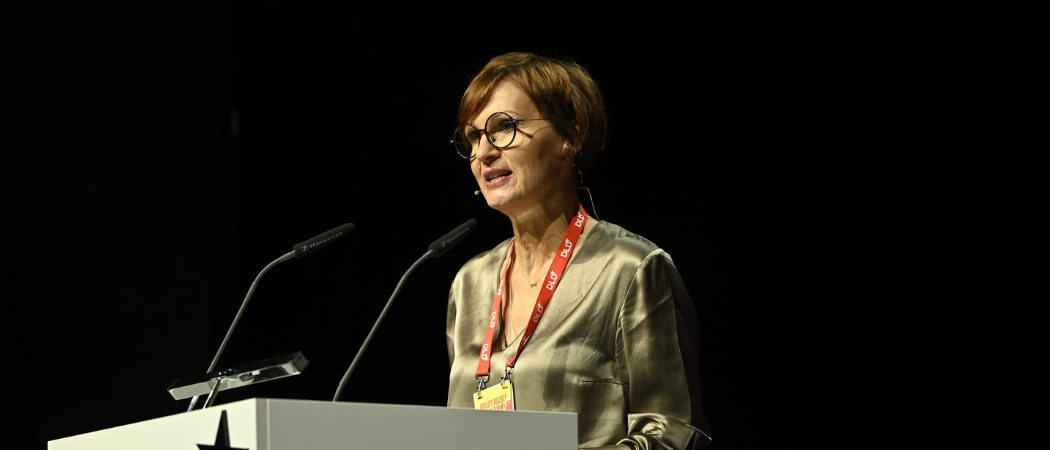After Sabine Döring is fired over outcry that academic freedom was under threat, the science minister’s future hangs in the balance

Bettina Stark-Watzinger, German Federal Minister for Education and Research. Photo credit: Picture Alliance for DLD / Hubert Burda Media
An academic freedom scandal in Germany has claimed a top-ranking official in the country’s federal Ministry of Education and Research (BMBF), after the ministry appeared to check whether it could strip funding from academics who had supported a pro-Palestinian protest camp.
Last night, it was announced that Sabine Döring, state secretary responsible for higher education, was to step down for creating the “impression” that the ministry had looked to see if it had grounds to cut grant funding to signatories of an open letter in support of the camp at the Free University in Berlin.
The scandal in Germany is the latest rift in European academia over how to engage with Israeli academics and universities following Israel’s months-long war in Gaza.
Some universities, particularly in Spain and Belgium, have cut ties to varying degrees to protest Israel’s offensive. But German science organisations and politicians have generally remained highly supportive of research ties to Israel.
As in other European countries, pro-Palestinian student protest camps have sprung up on German campuses, including at the Free University.
In early May, police cleared this protest camp, triggering an open letter from academics defending the students’ right to protest and assembly. While the letter lamented the humanitarian situation in Gaza, it did not explicitly back the camp’s demands – just their right to protest.
But this letter earned the ire of science minister Bettina Stark-Watzinger, who called it “staggering” in an interview with the Bild tabloid newspaper, and even questioned whether the signatories were acting constitutionally. She accused the camp protesters of hating Israel and Jews.
Then, a week ago, German media obtained internal emails that suggested her ministry had checked whether it could strip funding from signatories of the letter, and whether they had broken criminal law.
Although it appears the ministry concluded there were no grounds for action, the fact it even attempted such a check shocked the academic community.
“Linking an expression of opinion that is not subject to criminal prosecution with the question of the continued eligibility of academic work for funding would constitute a violation of academic freedom,” said Walter Rosenthal, president of the German Rectors’ Conference, in response.
Internal checks
On 11 June, Döring reacted with a public statement, confirming that the BMBF had made internal checks on whether the academics’ letter had broken any laws – and concluded it had not – but said stripping funding had never been under consideration.
However, this contradicted internal emails obtained by the media, which suggested stripping funding had been indeed been looked at, and the debate rumbled on.
Then, on 16 June, Stark-Watzinger said in a statement Döring would be let go.
Döring had initiated an internal review of the funding consequences for those that had signed the letter, the minster said, and had expressed herself in a “misleading” way, creating the “impression” that the ministry was looking to cut funding for signatories.
“The impression created is likely to cause lasting damage to the trust of scientists in the BMBF,” said Stark-Watzinger.
Döring, who prior to her time in the ministry was an academic philosopher, has not exactly gone quietly.
On X last night, she posted that this phase of her career was about to come to an “abrupt end”, before then posting that she had received a call telling her to take down the post. She then deleted both posts.
But the scandal is not yet likely to die down yet – particularly as Stark-Watzinger’s exact role in the funding check remains unclear. Given she led public attacks on the signatories, and even suggested they could be acting unconstitutionally, critics argue the buck stops with her.
Thomas Jarzombek MP, the research spokesman for the opposition Christian Democratic Union, called on X for Stark-Watzinger’s resignation.
She had accused the signatories of acting unconstitutionally, and therefore set the direction of the ministry which was then implemented by officials, he argued.





 A unique international forum for public research organisations and companies to connect their external engagement with strategic interests around their R&D system.
A unique international forum for public research organisations and companies to connect their external engagement with strategic interests around their R&D system.